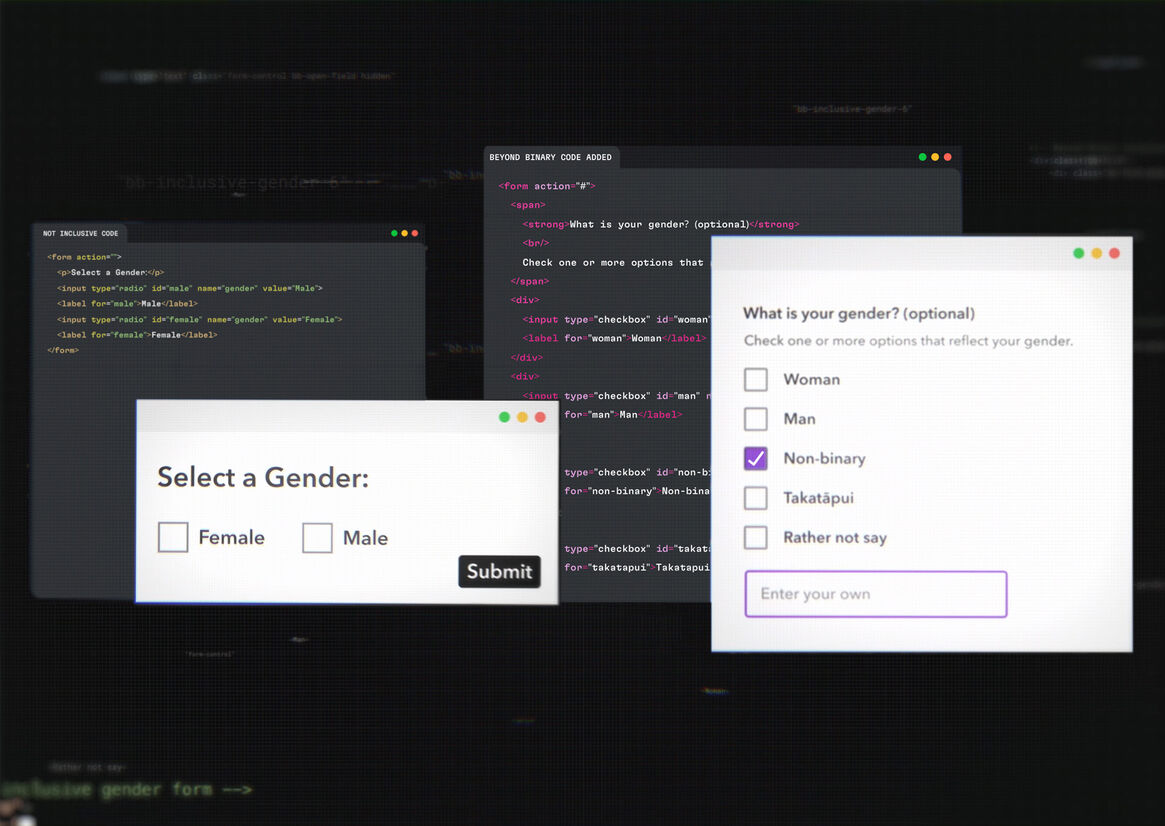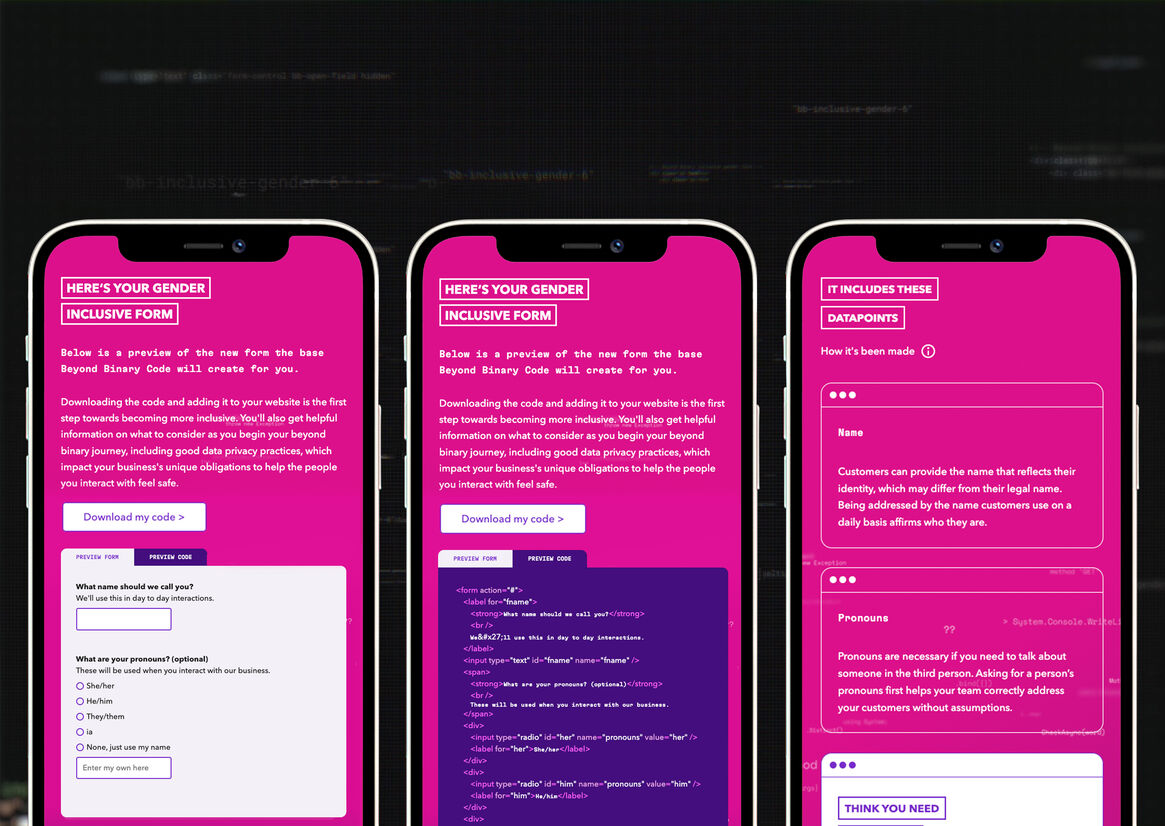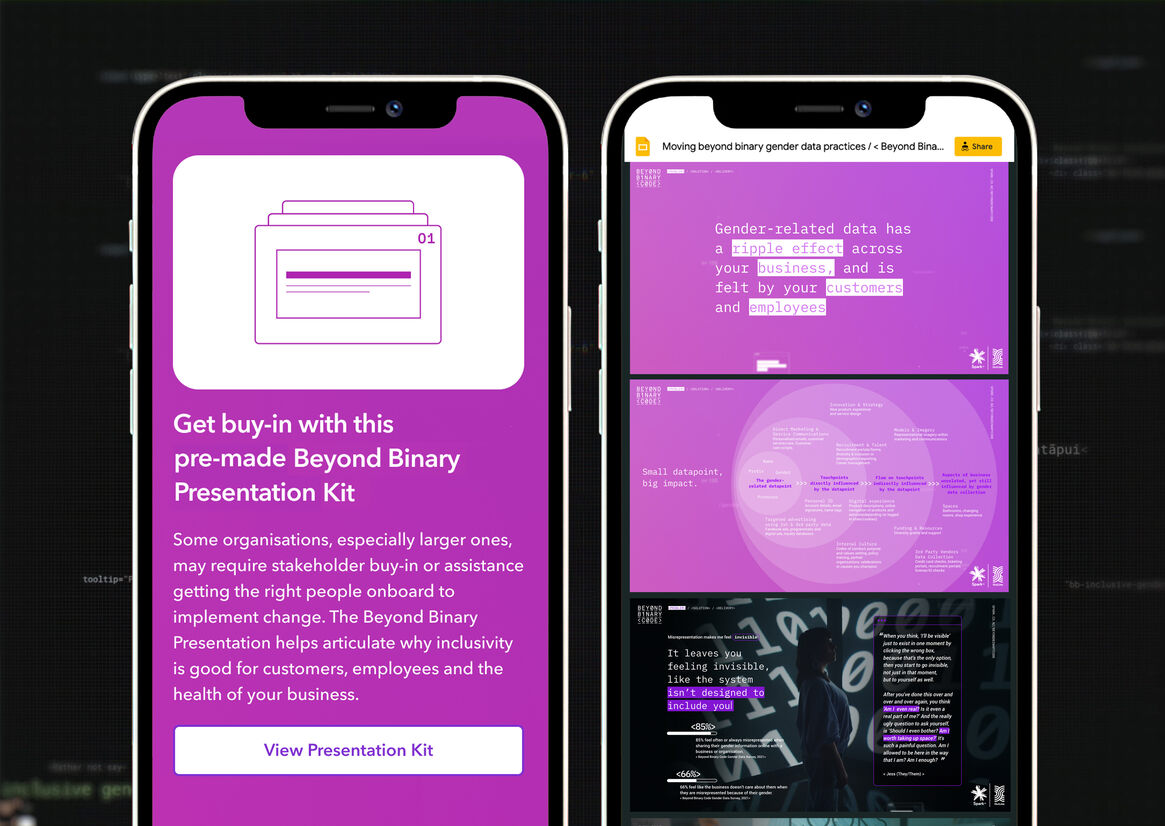Digital
Colenso BBDO 85 Beyond Binary Code
-
Pou Auaha / Creative Directors
Simon Vicars (CCO), Maria Devereux (CIO), Dan Wright (ECD), Beth O'Brien (Creative Director), Thomas Darlow (Creative Director)
-
Ngā Kaimahi / Team Members
Haylie Craig (Senior Art Director), Erin Mattingly (Copywriter), Lucy Grigg (General Manager), Ryan Butterfield (Senior Business Director), Jin Fellet (Business Manager), Elsi Gibbs (Business Manager), Rob Campbell (CSO), Lizzie McCollum (CX Strategist), Liam Norris (Social Planner), Elle Kiddie (Senior Digital Producer), Isabelle Hooper (UX Strategist), Jodie Heron (UI Designer), Kyle Wetton (Fullstack Engineer), Logan Maire (Head of Technology & Innovation), Hamish Steptoe (Senior Designer), Fern Holloway (Senior TV Producer), Zia Mandviwalla (Director, FINCH), Corey Esse (Managing Director, FINCH), Bex Kelly (Exec Producer, FINCH), Duncan Bernard (Producer, FINCH), Marty Williams (DOP), Julian Curran (Editor), Neville Stevenson (Production Designer), Pete Ritchie (Colourist), John Baxter (Projections & Online), Cam Ballentyne (Music Composition), Craig Matuschka (Sound Engineer), Tamara O'Neill (Producer, Liquid Studios), Billy Worthington (Copywriter), Anna Markova (Technical Lead) -
Kaitautoko / Contributors
Claire Black (General Manager, OutLine Aotearoa), James Malcolm (Communications CoOrdinator, OutLine Aotearoa), Aych McArdle (Co-Chair, OutLine Aotearoa) -
Client
Caitlyn Hayes





Description:
Opportunity:
When a form asks for gender data and it only has two options, trans and non-binary people are forced to lie. A daily hurt that makes them feel invisible and ignored.
Beyond Binary Code rewrites the internet to see more than two genders. Co-created with rainbow mental health organisations and trans and non-binary communities, it’s a single piece of a code that can be added to any website to make data forms and fields gender inclusive.
It includes:
1. Code builder tool. Helping businesses understand whether they need to collect gender data, and if so, customising the code to suit their needs.
2. Downloadable HTML code. Updating forms to create inclusive data sets and flow on experiences. Written to work in HTML and Java, as well as Wix, SquareSpace, WordPress and other direct-to-market website building software.
3. Business resources. Encouraging buy-in, implementing the code, understanding data privacy obligations, and celebrating the positive gender datapoint ripple effect.
4. Non-binary design language. Welcoming and representing trans and non-binary experiences through film, imagery and stories.
Approach:
Data on the communities we were helping is unaccounted for at a national level, so we turned to the human side of information to emotionally connect New Zealanders to the problem.
To create change we had 3 audience sets:
1. Trans, non-binary and rainbow communities. Despite launching during NZ Pride, this was not a rainbow-washing effort. To affect real change, the community members were co-creators, advisors, and advocates at every step.
2. Changemakers in business. The code is only one part of the beyond binary journey. We worked with NZ businesses to design tools and packs to help them get buy-in with management/stakeholders, and roadmap change they could then begin to implement.
3. Progressive apathetics. We brought to light a problem the rest of the nation probably hadn’t thought about, by getting them to understand its roots, and see the gathering of gender data as an archaic and unnecessary concept.
Many social cause movements happen online. So, social media became our primary outlet to start a conversation. Audience targeting allowed us to tailor and segment our communications, ensuring we could articulate exactly how a largely unknown problem impacts each set.
Over a two year period, Spark worked with rainbow mental health organisations as well as trans and non-binary communities. They also collaborated with gov’t organisations to understand the positive ripple effect a single datapoint like gender has in a business – from marketing/communications, to third party vendors, recruitment, talent, and spaces.
To lead change, Spark first had to evaluate their own gender data practices. As of today, the business does not collect gender data, operates from gender inclusive spaces, their IDs include preferred names and pronouns, and inclusivity training sessions are mandatory.
Results:
In the first 2 weeks of launch, the website recorded over 10k unique views, 200+ code downloads and started meaningful conversations with 36 major businesses.
Judge's comments:
Thought provoking and memorable. This campaign was effortless to access across all channels. It housed content that really educated you with clear pathways for action to make genuine change. It was on brand while elevating it, speaking to all users and cleverly talking to all. This campaign transcended what it needed to do and sparked a global conversation with comprehensive research to back it up.